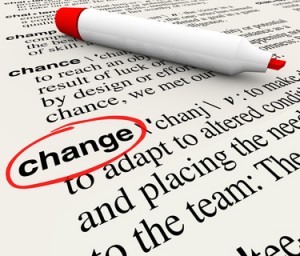Oh My! You Mean I Have to Change?
 My first wife, Jeanne, often said to me I was a “creature of habit.” The implication was that if I did not do things in the same way, for the same daily activities, it would throw me off at that moment, and could impact the entire rest of my day. I’ll admit to that, to an extent. I know that even now that Jeanne has been gone from my life on an everyday basis for a number of years, I will still do things routinely, particularly if they are mundane items that I do getting ready for my day in the morning, or before going to bed in the evening.
My first wife, Jeanne, often said to me I was a “creature of habit.” The implication was that if I did not do things in the same way, for the same daily activities, it would throw me off at that moment, and could impact the entire rest of my day. I’ll admit to that, to an extent. I know that even now that Jeanne has been gone from my life on an everyday basis for a number of years, I will still do things routinely, particularly if they are mundane items that I do getting ready for my day in the morning, or before going to bed in the evening.
Sometimes my routines serve me well. I for example take daily medications, and I am proud of the fact that I don’t ever skip dosages and I am very good at following regiments that are meant to help my health. To some extent, while I know that my schedule can change due to client needs, I am good about keeping excellent records on the calendar where I do my scheduling and on the financial records, where I keep track of my business’ revenue and expenses.
On the other hand, in many circumstances I react very well when crisis occurs. In fact, the more serious the crisis, the better I am. (Sometimes on less important things, I actually become unglued, which if there is one saving grace, I rather it happen on the less important than the more important things that happen). If a situation is changing, (health of a relative or loved one, a number of items appearing to come together at the same time on the calendar), I’m actually thinking ahead to how not only I, but those around me, may need to react if something more critical occurs. Some of it can be attributed to situations which have occurred in the past, and have prepared me for the future. Some of it is attributable in that I consider myself a good planner. A lot of it is “having pride,” in my ability to guide others through troubling times.
Why is this all coming to a head for me at this time? Lately I have been having a difficult time in terms of my emotions and what I consider others, resistance or denial, to accepting change. The relationships involved have been close and personal. My wife and I have been in a situation, which I prefer to keep confidential, that we prepared ourselves to react one way in respect to a situation at hand. Others, on the other hand, were focused on the same routine they do year after year, and insisting it had to stay the same way, (even if it meant resisting the wishes of an elderly relative who for all intents and purposes was clear on her wishes, but was told that she had no say whatsoever in a matter that directly impacted her well-being).
It turns out the ones who were resistant to change got their way this time. My emotions are cooling down. My wife completely focused her efforts on that elderly relative, and while disagreeing on what was done, was 100% making sure that elderly relative was kept safe while being forced to do what was against her will. (A quick lesson for me here, is on focusing on others who may handle a stressful situation differently than me, but keep their focus on the most important item in the scenario). And, tomorrow my wife and I will spend a couple of days away actually taking us to the situation we were prepared not to have in our life this year, but doing it differently than we have done for the last six years.
Change is not easy for many. It is impossible for some. And, it is inevitable for all of us in some circumstances. As this month’s quote for the Absolute Transition’s website highlights, often it is on the focus of what we are “giving up” that keeps us from wanting to change. Bringing in the piece, even if it feels more painful than what we are giving up at the time, may lie the ultimate lesson for us.
